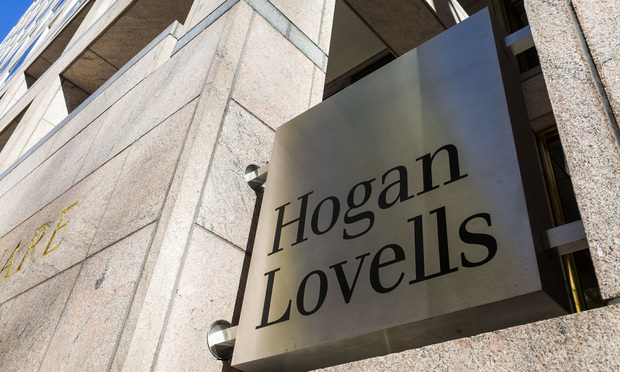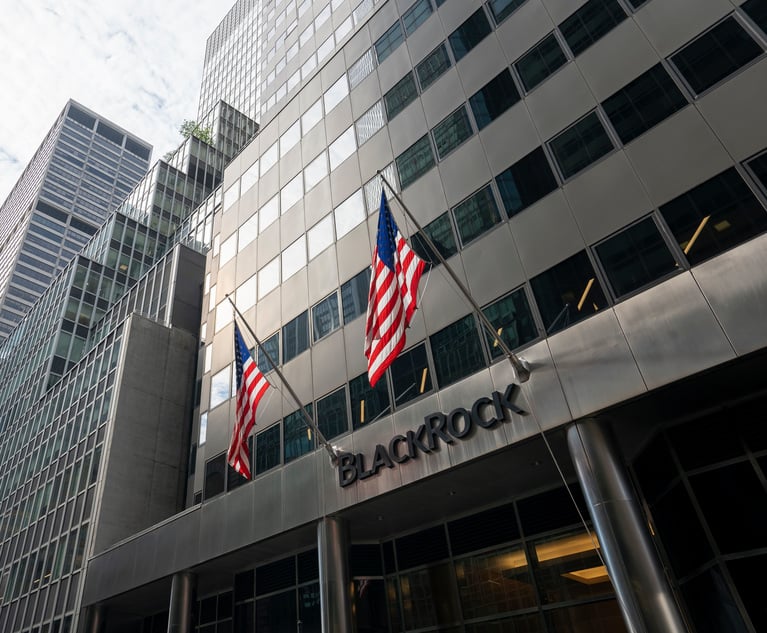How Hogan Lovells Has Lobbied for Saudi Arabia During Coronavirus Crisis
New filings made under the Foreign Agents Registration Act at the U.S. Justice Department offer a glimpse at some of the advocacy the firm has conducted for the Kingdom of Saudi Arabia amid the coronavirus outbreak.
April 23, 2020 at 03:12 PM
4 minute read
 Hogan Lovells' Washington, D.C., offices. Photo: Diego M. Radzinschi / NLJ
Hogan Lovells' Washington, D.C., offices. Photo: Diego M. Radzinschi / NLJ
Last week, within days of the world's leading producers agreeing to cut output in response to the coronavirus pandemic, a top lobbyist at Hogan Lovells sent out a barrage of emails on behalf of one of the firm's longtime clients: Saudi Arabia.
"We wanted to update you on how the Kingdom of Saudi Arabia (KSA) is leading global efforts to stabilize oil markets," wrote Norm Coleman, a Hogan Lovells senior counsel and former U.S. senator, in a message sent to more than two dozen congressional aides.
"The coronavirus pandemic has dramatically lowered global energy demand, harming producers around the world. As it has done for decades, KSA assumed its role as a global energy leader to negotiate this deal and help reduce the market imbalance," he added.
For many of the aides, it was not the first time they had heard this month from the former Republican senator, who was narrowly ousted by Al Franken in his 2008 reelection bid. A week earlier, Coleman had dropped into their inboxes, saying in identical emails that he wanted to keep them "updated on how the Kingdom of Saudi Arabia is leading regional efforts related to the current ceasefire and COVID mitigation in Yemen," in a civil war responsible for what is widely considered the world's worst humanitarian crisis.
The emails, recently disclosed on a Justice Department database, offer a glimpse into how Hogan Lovells advocated for the kingdom in connection with both its oil price war against Russia and the civil war in Yemen, where a Saudi-led blockade and bombings have caused immeasurable human suffering. Coleman sent his earlier email April 9, a day after Saudi Arabia announced a unilateral cease-fire to open talks and prevent the spread of coronavirus in the conflict with Houthi rebels, who have controlled the Yemeni capital for the past five years.
"The ceasefire presents an important opportunity for peace in Yemen. The [Houthis] watch what Congress says and what it does. It is critical that Congress press the Houthis to accept and adhere to the ceasefire and engage in meaningful peace talks," Coleman wrote.
A Hogan Lovells partner in Washington, Ivan Zapien, sent the same email to two aides for U.S. Rep. Vicente Gonzalez, D-Texas, a member of the House Committee on Foreign Affairs, according to filings the firm made under the Foreign Agents Registration Act, a decades-old law requiring the disclosure of U.S.-based influence work for overseas powers.
Hogan Lovells in January named Zapien the leader of the firm's government relations and public affairs practice. Zapien, the former top lobbyist for Walmart Inc., succeeded Coleman in that role.
Hogan Lovells' relationship with Saudi Arabia dates back to 1976, when the firm—then known as Hogan & Hartson—registered with the Justice Department as an agent of the country's. That initial engagement ended in 1980, according to a review of the Justice Department's foreign-agent database.
The firm registered anew as an agent of Saudi Arabia in 2007 and has since stuck with the country through international condemnation. In 2018, for instance, Hogan Lovells kept Saudi Arabia as a client even as the law firm Gibson, Dunn & Crutcher, along with Glover Park Group and BGR Group, dropped it following the killing of dissident Saudi journalist Jamal Khashoggi.
That year, Hogan Lovells was paid a monthly retainer of $125,000 to provide the kingdom with "strategic and legal advice on legislative, regulatory, and public policy activities of interest." Hogan Lovells reached a new agreement with Saudi Arabia last year raising the monthly retainer by $50,000, to $175,000, according to a foreign agent disclosure.
Read more:
'Unprecedented Need for Information': Inside Lobbying Frenzy Over Coronavirus Relief
Quinn's William Burck Is Now a Registered 'Foreign Agent' for Kuwaiti Contractor
Hourly Billing Rates, Latest Engagements: New and Notable FARA Filings
Gibson Dunn Ends Saudi Arabia Lobbying Contract
Gibson Dunn's Ted Olson Registers as Foreign Agent for Saudi Arabia
This content has been archived. It is available through our partners, LexisNexis® and Bloomberg Law.
To view this content, please continue to their sites.
Not a Lexis Subscriber?
Subscribe Now
Not a Bloomberg Law Subscriber?
Subscribe Now
NOT FOR REPRINT
© 2025 ALM Global, LLC, All Rights Reserved. Request academic re-use from www.copyright.com. All other uses, submit a request to [email protected]. For more information visit Asset & Logo Licensing.
You Might Like
View All
Supreme Court Denies Oil Giants' Appeal to End State Climate Suits

Who Got the Work: Gibson Dunn and Wilmer to Defend BlackRock in ESG Antitrust Lawsuit
2 minute read
11 Red State AGs Demand Damages in Antitrust Lawsuit Shaming ESG Climate Investors
3 minute read
Law Firms Mentioned
Trending Stories
- 15th Circuit Considers Challenge to Louisiana's Ten Commandments Law
- 2Crocs Accused of Padding Revenue With Channel-Stuffing HEYDUDE Shoes
- 3E-discovery Practitioners Are Racing to Adapt to Social Media’s Evolving Landscape
- 4The Law Firm Disrupted: For Office Policies, Big Law Has Its Ear to the Market, Not to Trump
- 5FTC Finalizes Child Online Privacy Rule Updates, But Ferguson Eyes Further Changes
Who Got The Work
J. Brugh Lower of Gibbons has entered an appearance for industrial equipment supplier Devco Corporation in a pending trademark infringement lawsuit. The suit, accusing the defendant of selling knock-off Graco products, was filed Dec. 18 in New Jersey District Court by Rivkin Radler on behalf of Graco Inc. and Graco Minnesota. The case, assigned to U.S. District Judge Zahid N. Quraishi, is 3:24-cv-11294, Graco Inc. et al v. Devco Corporation.
Who Got The Work
Rebecca Maller-Stein and Kent A. Yalowitz of Arnold & Porter Kaye Scholer have entered their appearances for Hanaco Venture Capital and its executives, Lior Prosor and David Frankel, in a pending securities lawsuit. The action, filed on Dec. 24 in New York Southern District Court by Zell, Aron & Co. on behalf of Goldeneye Advisors, accuses the defendants of negligently and fraudulently managing the plaintiff's $1 million investment. The case, assigned to U.S. District Judge Vernon S. Broderick, is 1:24-cv-09918, Goldeneye Advisors, LLC v. Hanaco Venture Capital, Ltd. et al.
Who Got The Work
Attorneys from A&O Shearman has stepped in as defense counsel for Toronto-Dominion Bank and other defendants in a pending securities class action. The suit, filed Dec. 11 in New York Southern District Court by Bleichmar Fonti & Auld, accuses the defendants of concealing the bank's 'pervasive' deficiencies in regards to its compliance with the Bank Secrecy Act and the quality of its anti-money laundering controls. The case, assigned to U.S. District Judge Arun Subramanian, is 1:24-cv-09445, Gonzalez v. The Toronto-Dominion Bank et al.
Who Got The Work
Crown Castle International, a Pennsylvania company providing shared communications infrastructure, has turned to Luke D. Wolf of Gordon Rees Scully Mansukhani to fend off a pending breach-of-contract lawsuit. The court action, filed Nov. 25 in Michigan Eastern District Court by Hooper Hathaway PC on behalf of The Town Residences LLC, accuses Crown Castle of failing to transfer approximately $30,000 in utility payments from T-Mobile in breach of a roof-top lease and assignment agreement. The case, assigned to U.S. District Judge Susan K. Declercq, is 2:24-cv-13131, The Town Residences LLC v. T-Mobile US, Inc. et al.
Who Got The Work
Wilfred P. Coronato and Daniel M. Schwartz of McCarter & English have stepped in as defense counsel to Electrolux Home Products Inc. in a pending product liability lawsuit. The court action, filed Nov. 26 in New York Eastern District Court by Poulos Lopiccolo PC and Nagel Rice LLP on behalf of David Stern, alleges that the defendant's refrigerators’ drawers and shelving repeatedly break and fall apart within months after purchase. The case, assigned to U.S. District Judge Joan M. Azrack, is 2:24-cv-08204, Stern v. Electrolux Home Products, Inc.
Featured Firms
Law Offices of Gary Martin Hays & Associates, P.C.
(470) 294-1674
Law Offices of Mark E. Salomone
(857) 444-6468
Smith & Hassler
(713) 739-1250










